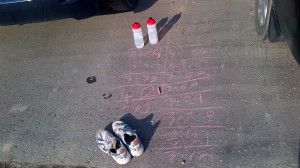One of the interesting things about becoming a runner is that it gets you in the habit of achieving the impossible.
What do I mean by this? I mean that many of us have had the experience of declaring that sometime in the future we will do something that we are currently physically incapable of. And then we do it.
Perhaps you can’t run down the street without getting winded, and yet you sign up for a 5k.
Perhaps you’re getting used to your 5k training runs, but you sign up for a marathon.
Perhaps you can’t swim, and yet declare to your friends your intention to complete a triathlon.
In each of these cases, there’s a task that you would find physically impossible if you tried to do it today. And yet, you sign up, you put in the training hours, and a few months later you find yourself achieving it.
You run your first 5k without stopping once.
You complete that daunting mud run.
You get that Boston Qualifier marathon time that’s been eluding you.
And in the process, you discover that the impossible can become possible.
I have decided once again to set myself an impossible goal. It’s quite straightforward – I want to run an 18 minute 5k. So why is this ‘impossible’?
- I can run five kilometres in 22 minutes quite easily, and indeed did that on Saturday twice after having completed the swim and bike portions of a triathlon.
- If I push myself, I can run five kilometres under 20 minutes, and have done so in a number of standalone races.
- Once, I have run five kilometres in just under 19 minutes. 18:50 to be precise.
I am physically incapable currently of running a full minute faster. This isn’t a question of willpower, it’s simply an honest evaluation of my body’s current ability to convert chemical energy into kinetic energy.
And yet I know that I am capable of changing my body so that it can achieve this goal. I’ve spoken in the past about the process for achieving challenging targets, whether athletic, financial, or relational:
- Have a clearly defined goal that you are passionate about.
- Learn the steps needed to reach it.
- Execute consistently.
So trying to run a sub-18 minute 5k gives me a wonderful opportunity to put this framework to the test again. First, motivation. I’m now in my late thirties, and I realise that even though it’s possible to be an outstanding endurance athlete well into your eighties, the body inevitable loses top end explosive speed and strength as it approaches forty. So now is an excellent time to try to set a ‘lifetime best’ 5k.
Also, I regularly train with other people that are trying to ‘achieve the impossible’, whether its running their first ever race or qualifying for the Boston Marathon. Out of solidarity and respect for my training partners, I want to feel what they are experiencing as they ask their bodies to perform in ways that they never have before.

The second element of the framework is planning. Running a fast 5k is different than training for a half-Ironman. I’ve been inspired by what Mo Farah has achieved over this distance in the last couple of years, and have every intention of learning from the training methods that Alberto Salazar has pioneered with him. So I’ll be working on core strength to improve my form and top-end speed, but most importantly, I’ll be doing the one thing that most casual runners that I know avoid: interval training. I started this again yesterday, running successive 1km loops in 3:30 with a two minute recovery. I’ll probably tweak the exact structure of my intervals as I learn more, but I know that the only way I can reach this goal is by acclimatizing my body more to lactic acid buildup.
And then the third element is simply execution. Doing one interval set is painful, but then it’s done. Going out and doing it again the next day on tired legs, and then again the next day, and then again the next, is something else. And that’s partly why I talk about my training in public – it forces me to be honest! One of the reasons I encourage people to sign up for races is because it is making a public announcement that you will take on a difficult challenge. It’s much harder to back out when all your friends have heard you brag about that marathon you’re going to run.
Here’s to achieving the impossible!